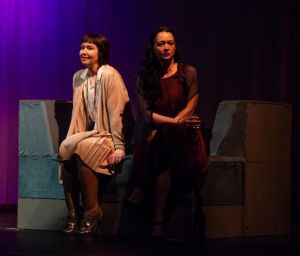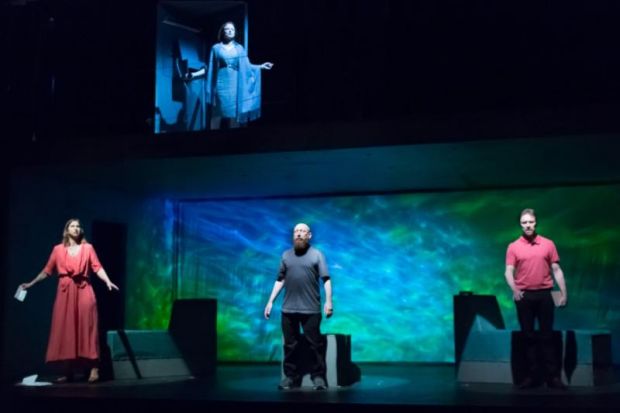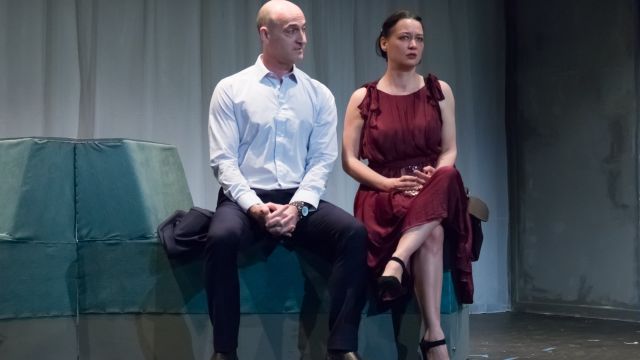Speaking in Tongues
Speaking in Tongues is two hours on the edge of your seat, unravelling a tangled skein wherein might lie your own relationship. The plot, driven by coincidence and connection and is riveting right until the last moment. The tension is augmented by an aching cello and a soundscape that thrums in the heat.
This minimalist set, a widescreen portal, does exactly what it was intended to do: it focuses attention on the text. It feels voyeuristic, as it should when peering into the workings of other people’s marriages. The set is bleak and detached, like the characters, but with the pull of a train wreck, it is impossible to look away.
The set is transformed in the second act – there was an audible “wow” in the audience - to accommodate outdoor spaces. The curtained wall of Act 1 becomes a projection screen and yet the action is still contained within the minds and spaces the characters inhabit. The audience is very much invested in the lives of the characters, who, with their faults and frailties, are relatable and very human, sometimes frightening, and, occasionally, funny.
The play is meant to be performed by four actors but Director Mel King chooses to differentiate the characters by having nine actors take the parts. It does help the audience navigate the complexities of the text but this means that Chris Hamley and Dave Bannister are left with not a lot of scope in terms of material and physical space.

Yet, all the performances are memorable. Arin Dean has come a long way in recent years. His portrayal of Pete as clueless and confused makes him warm and relatable. Steven Jones presents a similarly sympathetic Leon who differs from the character in the 2001 film, Lantana, in various ways. The stage version of Leon has more abandoned shoes to recover and is thus compelled, and compels the audience, to consider what it might mean to walk in them.
Sara Pensalfini as Jane (plain, looking for more) contrasts well with Vashti Pontaks as Sonja (angry and embittered). These challenging roles are undertaken by very capable and experienced performers. In synchronicity, they move through the performance space with Dean and Jones, connecting and disconnecting, revealing and concealing. It is compelling to listen to and compelling to watch.
Carrie McClean’s performance as Valerie requires a significant emotional range which juxtaposes against Sarah Phillips cold restraint in the role of Josephine. It is easy to appreciate how the character of Valerie is intimidated by Sandra (Aleksandra Crossan). In a play where betrayal is a significant theme, Sandra is the only character who is overtly malignant. Crossan makes her suitably believable yet simultaneously attractive and repulsive.
Andrew Bovell is a significant Australian playwright. Whether or not you have seen Lantana, the film developed from the play, this excellent production has something significant to offer.
Anne Blythe-Cooper
PREVIEW AND READ THE SCRIPT HERE.

Credits
Director: Mel King
Stage manager/Assistant Director: Danni Ashton
Lighting design: Jason James
Audio design: Nicolas Wilson
Set and Costumes: Matthew Stolp
Sound design: Nicholas Wilson
Cellist: Eliza Reynolds
Subscribe to our E-Newsletter, buy our latest print edition or find a Performing Arts book at Book Nook.

